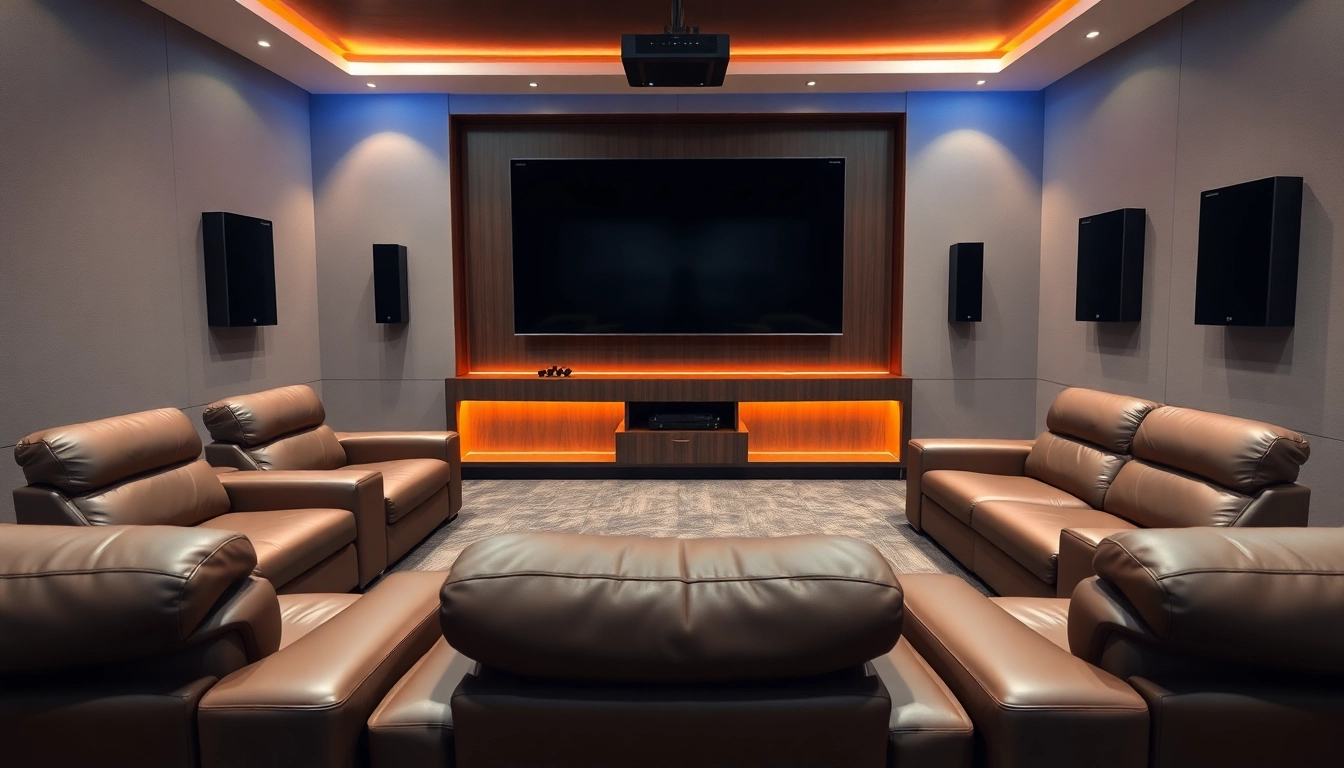
Creating the ultimate home theater experience starts with proper installation. When searching for home theater installation near me, the ultimate goal is to achieve a viewing and listening experience that closely mimics a commercial cinema. However, entering into this world of audio-visual complexity can be daunting without the right knowledge and support. Here’s an in-depth exploration of the home theater installation process, aimed at helping you make informed decisions for your entertainment setup.
The Importance of Home Theater Installation
Why Professional Installation Matters
While many homeowners might consider a DIY approach to setting up their home theaters, the advantages of hiring professionals far outweigh the perceived benefits of a personal setup. Professional installers bring a wealth of experience and expertise that can save you time, money, and trouble in the long run. They understand the technical nuances of audio-visual systems, ensuring that all components are not only compatible but also configured for optimal performance.
Common Mistakes in DIY Installations
DIY installations often lead to frustrating experiences, common pitfalls include:
- Poor Equipment Selection: Without the right knowledge, it’s easy to choose equipment that doesn’t suit your specific space or needs.
- Improper Calibration: Video and audio systems need precise calibration. Incorrect settings can lead to subpar performance, with images that are too dim or audio that’s not immersive.
- Substandard Wiring: Inadequate or improper wiring can lead to annoying tangles or signal drops, diminishing the overall quality of the experience.
- Neglecting Acoustics: A key factor in any home theater setup, professional installers assess acoustics while positioning the speakers, which DIY setups often overlook.
Benefits of Hiring Local Experts
Engaging local experts for your home theater installation offers several benefits:
- Local Knowledge: Professionals in your area understand regional preferences and common home layouts, allowing them to tailor their services effectively.
- After-Sales Support: Local installers are more likely to offer ongoing support and maintenance services that can be essential for troubleshooting and upgrades.
- Community Engagement: Supporting local businesses can foster community relationships and contribute to the economy.
Understanding Your Home Theater Needs
Choosing the Right Equipment for Your Space
The selection of equipment for your home theater is critical. Factors to consider include:
- Screen Type: Depending on your viewing preferences and room size, options include projectors, LED, OLED, and LCD screens.
- Audio Systems: Choose between soundbars, surround sound systems, and high-end audiophile setups, based on your budget and sound quality requirements.
- Seating Arrangements: Invest in comfortable seating that enhances the viewing experience, allowing for proper sight lines and comfort during extended viewing sessions.
Tailoring Your Home Theater for the Best Experience
Customization is key in creating an optimal home theater environment. Consider:
- Room Design: How furniture placement can affect viewing angles and sound quality.
- Lighting Control: Implement blackout curtains or adjustable lighting to enhance the viewing experience.
- Temperature Control: Keep the room comfortable to avoid distractions during long viewing sessions.
Assessing Room Acoustics and Layout
Room acoustics play a crucial role in the overall effectiveness of your sound system. Professional installers usually conduct acoustic assessments that include:
- Sound Reflection and Absorption: Identifying surfaces that may reflect or absorb sound and adjusting accordingly.
- Speaker Positioning: Strategically placing speakers for optimal sound distribution.
- Use of Acoustic Panels: Implementing sound-absorbing materials to enhance sound quality.
Steps to Choose a Home Theater Installation Service Near You
Research and Compare Local Options
Finding the right home theater installation service involves thorough research. Look for:
- Specialization: Focus on companies that specialize in home theater installations rather than general electronics installation.
- Service Range: Ensure the company offers a complete package from consultation to installation and support.
- Availability: Check if they can accommodate your schedule and are available for follow-up maintenance.
Reading Reviews and Testimonials
Customer feedback can provide invaluable insights. Look for:
- Online Reviews: Sites like Yelp, Google, and specialized AV forums can shed light on previous clients’ experiences.
- Case Studies: Companies might feature case studies showcasing their work, providing a look at their capabilities and attention to detail.
Getting Quotes and Estimates
Once you compile a list of potential providers, contact them for quotes. Effective quotes should include:
- Itemized Costs: Understand each component’s cost, labor, and any potential additional charges.
- Warranty Information: Know what warranties come with equipment and installation services.
- Services Included: Clarify what services you will receive, such as installation support and setup.
Installation Process Explained
Pre-Installation Research and Planning
Prior to installation, a thorough planning phase must be initiated:
- Initial Consultation: A discussion of your needs, preferences, and budget.
- Space Assessment: Professional installers will visit your home to measure the space and evaluate acoustics.
- Design Plan: A detailed plan outlining where equipment will be placed to ensure optimal performance.
The Installation Day: What to Expect
This day will typically involve:
- Equipment Setup: Careful placement and installation of all components.
- Testing: Proper testing of audio and video systems to ensure everything works as expected.
- User Training: Briefing homeowners on using and troubleshooting the equipment.
Post-Installation Support and Tips
Your relationship with the installer doesn’t end on installation day. Ensure they provide:
- Follow-Up Support: Confirm that the company offers support for addressing post-installation issues or repairs.
- Maintenance Advice: Learn about upkeep procedures that can prolong the life of your system.
Maximizing Your Home Theater Experience
Integrating Smart Home Technology
Integrating smart home solutions can elevate your home theater experience further. Consider:
- Control Systems: Smart remote controls or systems like Amazon Echo or Google Home that allow for seamless control.
- Mobile Apps: Use smartphone applications to easily customize settings and manage your home entertainment.
Maintenance Tips for Longevity
Maintaining your home theater system is vital for longevity. Best practices include:
- Regular Updates: Ensure all software or firmware is up to date.
- Routine Cleaning: Dust and clean the equipment to prevent overheating and loss of performance.
- Check Connections: Periodically check cables and connections for wear and ensure a secure fit.
Upgrading Your Setup Over Time
Your home theater can adapt and grow with your needs. Stay informed about:
- New Technologies: Stay up to speed with advancements in audio and video technology.
- Component Compatibility: When upgrading, ensure new components are compatible with existing equipment.
- Professional Advice: Always consider consulting with professionals before major upgrades to ensure the best results.






